Former Cawthorn
Cambridge Interns at BIOS
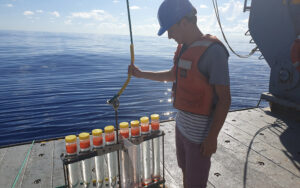 Jamie Hilditch, 2019
Jamie Hilditch, 2019
During his internship at BIOS, Jamie Hilditch (Department of Applied Mathematics and Theoretical Physics) spent 12 weeks working under the joint guidance of Drs. Rodney Johnson and Maureen Conte. Jamie took part in a research project that aimed to broaden understanding of the physical and biogeochemical mesoscale variability at the Bermuda Atlantic Time-series Study (BATS) site.
Jamie said, “My internship at BIOS was a fantastic insight into the world of physical oceanography. I thoroughly enjoyed my time both out on BATS cruises and doing my research back at BIOS and I was rewarded with some great experiences which stand me in good stead for my future plans. I would definitely recommend an internship at BIOS to anyone who has the opportunity and I would like to thank those who made this opportunity possible for me.”
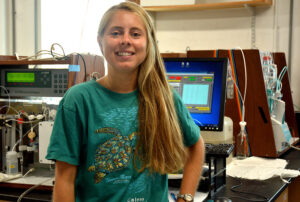 Anna Prescott, 2018
Anna Prescott, 2018
Anna (Department of Earth Sciences) spent 12 weeks at BIOS as the 2018 Cawthorn Cambridge Intern. Mentored by Professor Nicholas Bates, Anna used data collected as part of the Bermuda Atlantic Time-series Study (BATS) to determine how ocean chemistry is changing over time due to climate change. Employing a variety of data analysis techniques and computer modelling systems as part of her research Anna’s results confirmed that the ocean is warming and becoming more acidic, findings which correlate with established observations.
Following her internship Anna said, “For a long time I have been very interested in oceanography and marine biogeochemistry. I have had an introduction to these topics at the University of Cambridge but this internship was the perfect opportunity to learn more about these fascinating fields. I hoped to gain practical research skills and field work experience and BIOS has taught me this and a huge amount more. I have learned what scientific research is all about and what working in a lab involves. My experience at BIOS has opened my eyes to a huge variety of research avenues.”
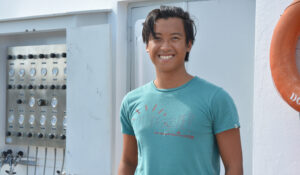 Scott Li, 2017
Scott Li, 2017
During his 12-week internship Scott (Department of Applied Mathematics and Theoretical Physics) worked with the COral Reef Airborne Laboratory (CORAL) at BIOS. Aiming to understand where reefs are located, and how healthy they are, CORAL utilizes a specifically outfitted airplane that flies 28,000 feet above sea level to survey huge swaths of the ocean, acquiring data that are verified by in-water divers on location. The technique which has been employed for terrestrial research was applied to investigate the health of reefs in areas such as Australia, Palau, Guam, Hawaii, and the Florida Keys.
Scott commented, “The internship was fantastic, and after completing it I feel confident that I want to work towards a PhD. It was a great experience being able to see how all the fieldwork is conducted here, such as extracting corals from the reefs, and the organization it entails. I would recommend anybody who has the opportunity to participate in an internship at BIOS to do so.”
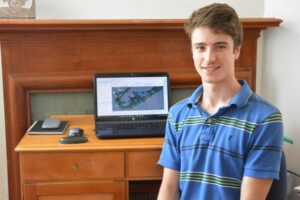 Thomas Perkins, 2016
Thomas Perkins, 2016
After completing his third year at Downing College (Department of Earth Sciences), and before returning to Cambridge University to begin his Master’s degree, Thomas spent the summer at BIOS as the 2016 Cawthorn Cambridge Intern. Thomas, mentored by Dr. Mark Guishard, worked to analyze perspectives on hurricane risk by building a hurricane catastrophe model to assess damage to Bermuda both in years past and the future, especially considering potential changes in climate. He was able to find a pattern of damage to Bermuda through tracking hurricane activity in the Atlantic Ocean using data sets on file. Thomas also looked at geologic core samples of mud and sand in coastal lakes, using deposits found in the stratigraphy as a record of storm events in the past. The model Thomas developed during his internship at BIOS enables comparison of today’s hurricane activity with that of the past and serves as a valuable risk assessment tool for Bermuda.
Thomas said of his time at BIOS, “The internship was well designed to be very mutually beneficial and I’m pleased to say it has been very successful. I came to BIOS hoping to learn more about conducting independent research in a supportive environment. I was specifically keen to learn more about coding and its application to a scientific problem. By adapting an existing hurricane catastrophe model to Bermuda and writing additional code in R, I have definitely learned a lot about this. I’ve also gained an insight into how to conduct research and hopefully about publishing a paper, although at the time of writing this is still in its early stages.“
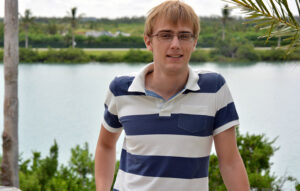 Alexander Chamolly, 2015
Alexander Chamolly, 2015
Alex Chamolly (Department of Applied Mathematics and Theoretical Physics) was the 2015 Cawthorn Cambridge Intern at BIOS. Alex had just completed a BA in Mathematics when he came to BIOS for this internship. During his time here, Alex was mentored by BIOS oceanographers Dr. Rod Johnson and Professor Nicholas Bates. Alex worked with the Bermuda Atlantic Time-series Study (BATS) to create a model for CO2 advection directions using data obtained during BATS cruises. Although Alex’s project was focused on creating this model using his mathematics background, he also participated in research cruises on the R/V Atlantic Explorer. By the end of his internship, Alex had successfully created a working model with future goals including modeling more quantities such as nitrogen and oxygen and analyzing the directions of advections to possibly identify regular patterns.
Alex commented, "I've always been strongly considering research, but wanted to gather some experience before making the decision. I am very glad to have the opportunity to participate in the research undertaken here at BIOS, in particular because it is not obviously related to my university studies up to this point. It's given me a great new perspective and I am more confident that work of this kind is what I'd like to pursue in the future."
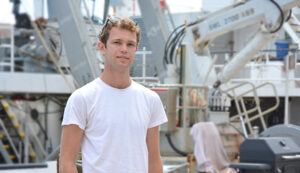 Oliver Lawrence, 2014
Oliver Lawrence, 2014
During his internship at BIOS, Oliver Lawrence (Department of Earth Sciences) used hyper-spectral imagery to map the reef community in Kaneohe Bay, Hawaii and to build a computer model that produced estimates of reef morphology and community distribution. Oliver was then able to test his model and make future predictions. Throughout the project, Oliver had access to some of the world’s leading experts in the field, as well as state-of-the-art technology. Oliver completed his Part III project in January 2015 which was largely based on his internship research at BIOS, where he was mentored by Dr. Eric Hochberg.
Following his internship Oliver said, “I didn’t really know what to expect, but I’ve been really impressed by the atmosphere at BIOS. It is such a friendly place to be, and there are scientists at various stages in their career that are happy to sit and talk to you about their work, and offer advice and guidance. I completely understand why students, interns, and visiting scientists come back to BIOS time and time again, it is just such a fantastic place to learn.”
Program Contact
Dr. Andrew Peters
Director of Education for University Programs & Associate Scientist
apeter95@bios.asu.edu
Tel: 441-297-1880 x240
Audrey Pope
University Programs Internship Coordinator, Communications and Data Manager
audrey.pope@bios.asu.edu
Tel: 441-297-1880 x115
Related Items
Cawthorn Cambridge Internship at BIOS
Cawthorn Cambridge Flyer
